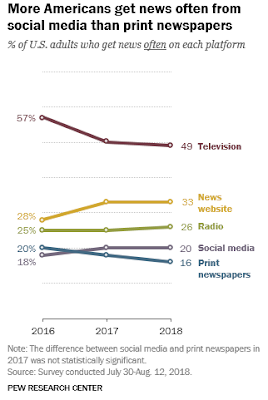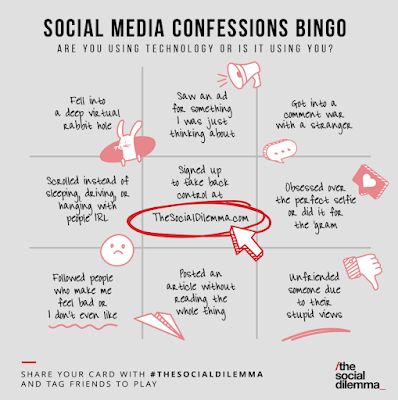1. Before starting, what social media accounts do you have?
The rise of Social Media as a Socialization Agent
For decades, television was a dominant force of socialization. Myriad research shows how dominant television, especially advertising has been and you can see more at this older post of mine here. However, over the last 10 years, online social media has increasingly played an incredible role in influencing people. For our next agent of socialization, we will examine social media and its role in socializing people.
Social media arguably has both positive and negative effects on society. Whether you want to focus on either of those, it is clear that social media has had a transformational effect on American society and it is a strong agent of socialization.
Positive Effects
One of the positive effects of social media is detailed in this research by Miller, et. al. about how social media provides an outlet for non-whites experiencing racial discrimination. From the introduction (full article here),
Racial coping can be understood through three main approaches: racial and ethnic identity development, social support, and confrontation and anger expression (Brondolo et al. 2009). We argue that social media allow these approaches to be carried on in the online sphere as a way to cope with both online and offline forms of discrimination. Thus, social media can be a site of expression for racial identity, a place where Black Americans and other communities come together to air grievances, seek support, and denounce those who oppress them. This is exactly what drives our research question: do those who experience higher levels of discrimination use more social media?
We argue that social media may be an additional outlet for coping with the negative effects of racial discrimination, as social media allows all aforementioned forms of coping, racial and ethnic identity development, social support, and confrontation and anger expression.
2. Not all aspects of social media are dysfunctional. What are some of the ways that social media has played a role in shaping you positively? Are there any online communities that are supportive of your own sense of self?
Anti-Social Media
Felmlee and Faris published Toxic Ties; Networks of Friendship, Dating and Cyber Victimization in Social Psychology Quarterly (2016) about the ways that social media can strain relationships among friends and dating partners. LGBTQ teens are most at risk followed by females then males.
Social Media Usage
Open this link and think about what is true for you.
3. Which of the findings in the links above are true for you?
Social Media Used for "News"
A 2021 PEW study showing social media use and news.
More Americans get news on social media than from print newspapers. In 2018, one-in-five adults said they often get news on social media. And Facebook continues to dominate as the most common social media site used for news by Americans: About four-in-ten Americans (43%) get news on this site.
4. Which of the platforms in the graph above do you often get your news from?
The growing trend of getting news online is particularly concerning because a 2020 study found that:
Americans Who Mainly Get Their News on Social Media Are Less Engaged, Less Knowledgeable
Those who rely on social media for news are less likely to get the facts right about the coronavirus and politics and more likely to hear some unproven claims.
Social media users were the second most likely group to have low political knowledge.
Social media users were more likely to have heard
conspiracy theories about the pandemic.
Social Media and You
Have you ever stopped to think about what social media knows about you? Think about the last time you bought something at a store. If the salesperson was a stranger, would you tell them everything that your social media knows about you? Look at this post from Tech News and the chart that they included from clario (below):
Social Media Bingo
How does this happen?
The Social Dilemma
A 2020 documentary called The Social Dilemma (available on Netflix) details the influence of social media.
(TEACHERS NOTE: There is a free and easy-to-use accessibility solution available now for educators who register their event on our website. Since you may have already registered an event(s) in the past few months, we’re linking directly to the Educator Resources document that includes details on how to access the film. When you plan to screen the film again, please re-register your event to receive permission and an up-to-date password for the screening link, which changes frequently.)
Film Summary
The Social Dilemma is a 2020 American docudrama that explores the rise of social media and the damage it has caused to society, focusing on its exploitation of its users for financial gain through surveillance capitalism and data mining, how its design is meant to nurture an addiction, its use in politics, its effect on mental health (including the mental health of adolescents and rising teen suicide rates), and its role in spreading conspiracy theories such as Pizzagate and aiding groups such as flat-earthers.
There are three distinct settings in the documentary:
- Real people from tech industry discussing social media and their first-hand knowledge/experience.
- A drama used to show an average family and how social media affects them.
- A dark room with three people which simulates the artificial intelligence at play behind the scenes.
Resources
Here is the website for the documentary.
Here is a full unedited transcript of the documentary from the website scraps from the loft, but I also edited down the full transcript to highlight the parts that I felt were the most important. You can see my edited version in 4 parts:
- The documentary was made by dozens of tech executives who have expressed concern about the influence of social media.
- The documentary is interspersed with a docudrama that shows how social media is in the background shaping the lives of one family.
There is a transcript of the documentary here.
The beginning of the movie raises the question, "What is the problem?"
Jaron Lanier explains that,
it is not just that, "we are the product and that our attention is the product being sold to advertisers. That's a little too simplistic. It is the gradual, slight, imperceptible change in your own behavior and perception that is the product. And that is the product. That is the only possible product...."









No comments:
Post a Comment